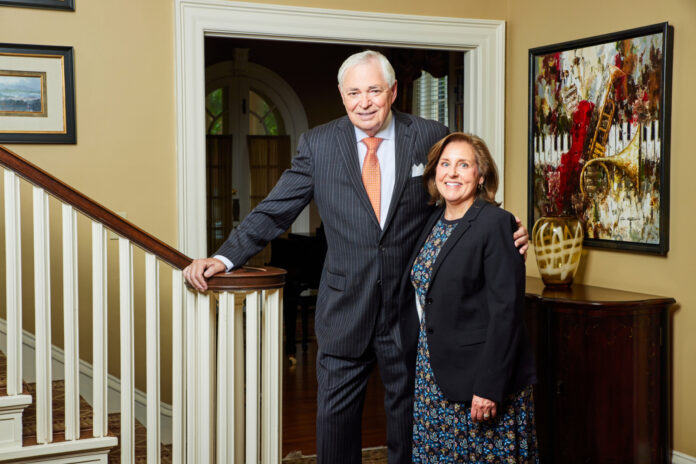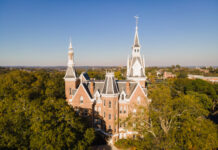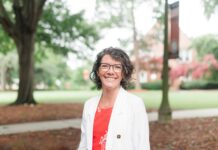Fulfilling a pledge he made when elected as Mercer University’s 18th president in December 2005, William D. Underwood will conclude his academic career where it began — in the classroom.
Underwood informed the Board of Trustees at its April meeting on the Atlanta campus that he is stepping down as president to return to full-time teaching in 2026. He will hold the Tommy Malone Distinguished Chair in Trial Advocacy at Mercer Law School.
A Presidential Search Committee chaired by former board chair and current trustee Richard A. (Doc) Schneider has been tasked with identifying and recommending Mercer’s 19th president.
“I could feel Mercer’s soul the first time I visited campus. Being responsible for the stewardship of this special place — for preserving it for future generations — has been the professional honor of a lifetime,” Underwood said. “I am grateful to the talented and supportive board members who entrusted me with this responsibility. I am thankful for the strong and stable senior team members who have been by my side. And I am especially grateful for the students, faculty and staff who have inspired me. Now I look forward to achieving my long-held ambition of stepping back up to the classroom.”
Underwood has led the University during a period of dynamic growth and development. Enrollment has increased by over 30% to more than 9,200 students enrolled in 12 schools and colleges.
“President Underwood’s work transformed Mercer into a national research university and a global force for bettering the lives of those we serve,” said Board of Trustees Chair Thomas P. (Tom) Bishop, CLAS ’82, LAW ’85. “His efforts updated and expanded all our campuses in ways that helped the University and their surrounding communities. That vision for growing Mercer also helped advance the redevelopment of downtown Macon, most recently with the announcement of the new Medical School campus project on Riverside Drive. We are so fortunate for President Underwood’s tenure.”
“Student learning and teaching are at the core of President Underwood’s leadership ethos of this university. His ongoing engagement with students — his embracing their aspirations, listening to their challenges, and seeking to create an environment that enables their thriving — has informed his presidential decision-making,” said Cathy Callaway Adams, TIFT ’81, chair of the Board of Trustees Executive Committee and former chair of the board. “From construction projects to new curriculum offerings to athletics to gathering spaces to music and arts opportunities to study abroad and more, President Underwood has established University strategy and measured success by its impact to students and how effectively Mercer is equipping them to lead lives of service and purpose. We are grateful his impact will continue with his return to his first love of classroom teaching.”
Prior to becoming Mercer’s 18th president, Underwood served at Baylor University as interim president and held the prestigious Leon Jaworski Chair at the Baylor School of Law. In 2004, he was named a Master Teacher at Baylor — at the time one of only 21 in the institution’s history to be so designated — in recognition of extraordinary classroom teaching over an extended period.
Living out Mercer’s mission
Presidential transitions are rare at Mercer. The University has had only three presidents over the last 65 years.
When Underwood, 69, assumed the presidency from Dr. R. Kirby Godsey, Mercer’s longest-serving president at 27 years, on July 1, 2006, he took stewardship of an institution that was on the cusp of celebrating the 175th anniversary of its founding.
It also was in the final stages of winding down its historic relationship with the Georgia Baptist Convention, whose leaders in 1833 founded the institution. The two entities had come to the conclusion that they were incompatible and decided to part ways.
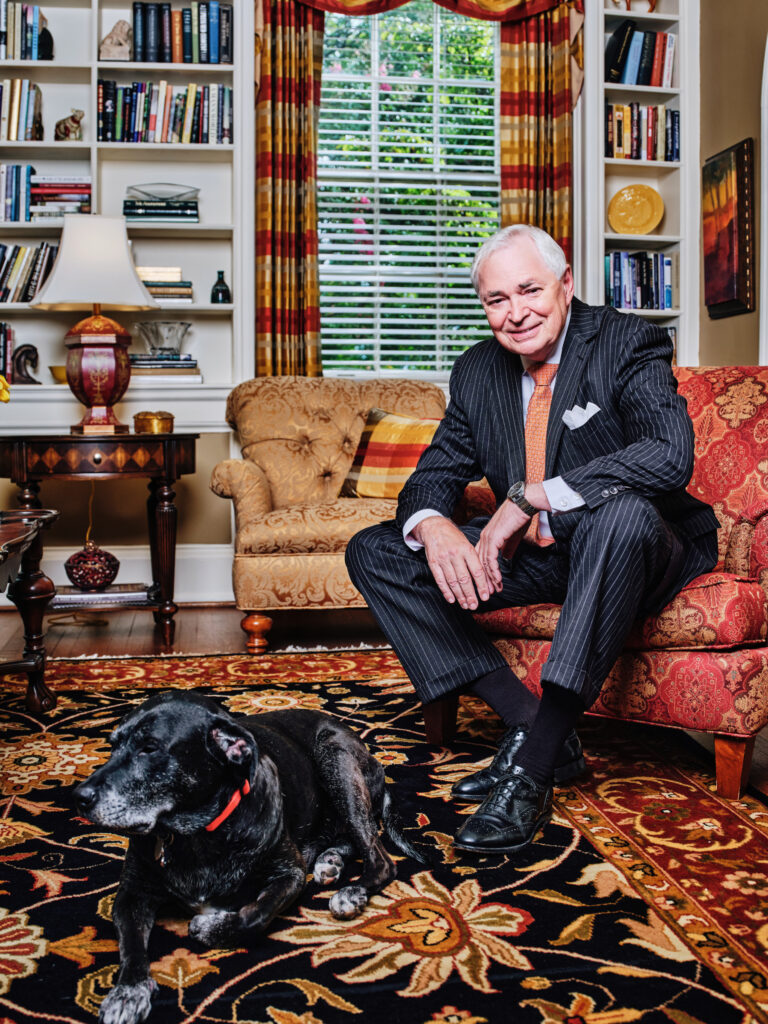
The son of a Baptist minister, Underwood knew that Mercer’s soul was rooted in its commitment to religious and intellectual freedom and embracing the worth and potential of every student. From the outset of his administration, he sought to ensure that the University’s soul was nurtured and preserved for future generations and cultivated in new ways.
In the spring of 2006, as president-elect, he charged University Minister Dr. Craig McMahan with creating a program that would combine service, research and study abroad to expand the University’s reach around the world and deploy the talents, skills and knowledge of students and faculty to improve the human condition.
A year later, in 2007, Mercer On Mission was established and sent 38 students and six faculty to Guatemala, Kenya and Brazil. Over the ensuing years, Mercer students and faculty have fitted more than 23,000 amputees in Vietnam with low-cost prosthetics, invented patented mechanisms to protect artisanal gold miners from dangerous mercury vapor in South America and Central America, designed and installed systems to bring clean water to rural communities in Africa and the Dominican Republic, helped widows from the Rwandan genocide start businesses, and so much more.
Almost 3,000 students and faculty have participated in more then 200 Mercer On Mission projects around the world since 2007. Generous support from donors including the Eula Mae and John Baugh Foundation, the Sheridan Foundation and hundreds of Mercer alumni and friends, have underwritten the costs of the program, so students only pay tuition for coursework associated with the projects. All their travel and in-country expenses, as well as funds for equipment and supplies, are covered by gifts.
“Through Mercer On Mission, members of our community live out the imperative of loving our neighbors as ourselves,” Underwood said. “Hundreds of students, faculty and staff are deployed annually to more than a dozen countries where they carry out sustainable, impactful research and service programs. Through this work, they learn what it means to live full and meaningful lives.”
Today, Mercer On Mission is a signature program of the University, envisioned by Underwood as an impactful way for Mercer to live out its mission to teach, to learn, to create, to discover, to inspire, to empower and to serve.
Expanding the University’s footprint and national stature
Underwood also leaves a legacy of expanding Mercer’s footprint across the state of Georgia and elevating its national stature.
During his tenure, the Mercer Health Sciences Center was established, incorporating the School of Medicine, College of Pharmacy, College of Nursing, and the University’s newest academic unit, the College of Health Professions. Collectively, the Mercer Health Sciences Center enrolls almost 2,000 students who are preparing to be physicians, nurses, pharmacists, physical therapists, physician assistants, public health professionals, athletic trainers, psychologists, marriage and family therapists, and researchers.
The School of Medicine, established in 1982 to prepare primary care physicians to educate physicians and health professionals to meet the primary care and health care needs of rural, medically underserved areas in Georgia, has expanded across the state over the last 20 years. It now has four-year M.D. campuses in Macon, Savannah and Columbus, and a two-year M.D. clinical campus in Valdosta. It is one of the largest private medical schools in the country.
Mercer Medicine, the faculty practice plan of the School of Medicine, expanded beyond Macon and now operates additional clinics in Plains, Clay County, Harris County, Putnam County, Taylor County and Jekyll Island, delivering primary care to parts of the state that previously had among the worst health outcomes in Georgia.
Underwood has also led the University to significantly increase its research expenditures to almost $50 million a year, resulting in Mercer’s admission to the Georgia Research Alliance and its reclassification as a Doctoral Research University with High Research Activity (R2), one of only 139 such institutions in the nation.
A long-held aspiration of the University to be awarded a chapter of Phi Beta Kappa, the nation’s oldest and most prestigious honor society, was realized in 2015, putting Mercer in an elite group of liberal arts institutions.
Campus transformation
Mercer’s campuses have undergone physical transformations during Underwood’s presidency.
More than $400 million has been invested in new facilities and major renovations in Macon, Atlanta, Savannah and Columbus.
The Macon campus, in particular, looks quite different from when Underwood took office in 2006. Virtually every corner of the campus has been touched, including new entrances, creation of large green spaces, clearing out of obsolete buildings and construction of major new facilities like the Godsey Science Center.
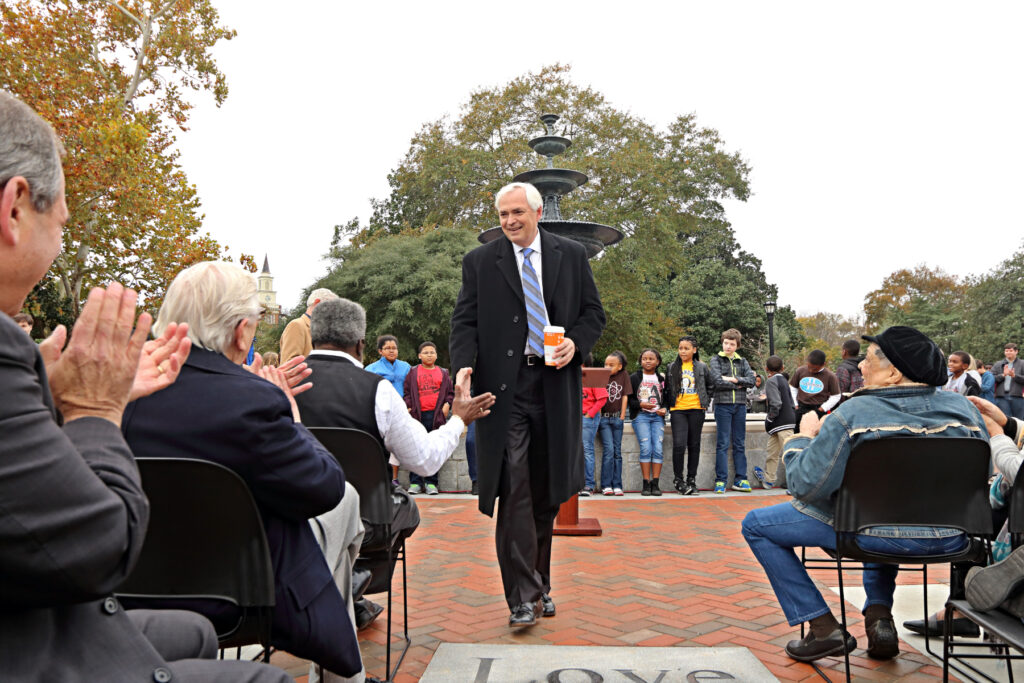
A big change to the Macon campus was the re-introduction of intercollegiate football in 2013, after a 72-year hiatus. That resulted in construction of the Ruth and Homer Drake Field House and Five Star Stadium, along with other major improvements to the west side of campus.
More than 1,000 beds of student housing have been added to the Macon campus since 2010 to accommodate the growing undergraduate enrollment.
The Cecil B. Day Graduate and Professional campus in Atlanta has added more student housing, new green spaces and the state-of-the-art, 65,000-square-foot Moye Pharmacy and Health Sciences Center, which opened in 2024.
Financial strength
While the University has grown significantly over the last two decades, it has done so with Underwood’s commitment to fiscal discipline and creating value for Mercer students.
One of the criticisms of higher education is the rate at which costs have increased and student debt has grown.
Since early in his tenure, Underwood has mandated that tuition increases be kept at or below the rate of inflation, as measured by the consumer price index. Some programs, such as law and medicine, have had multiple years of no tuition increases. In 2020, during the COVID-19 pandemic, Mercer froze tuition for undergraduates.
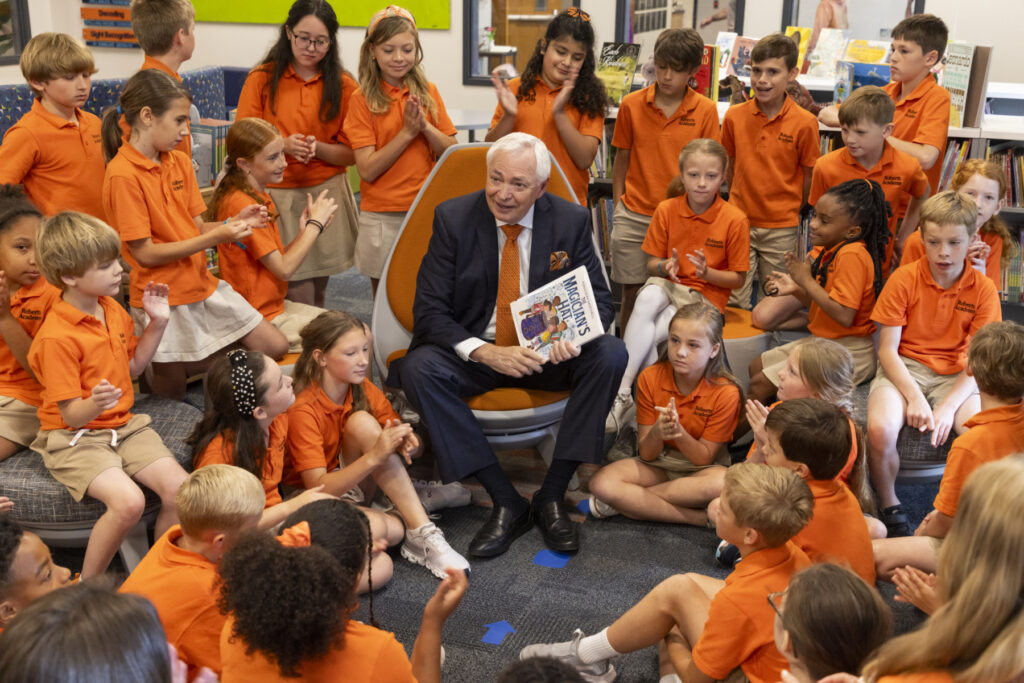
As a consequence, Mercer’s costs relative to its peer institutions have gone down, resulting in multiple college guides and national rankings naming Mercer a “best value.” Average student debt has also gone down relative to other institutions. Today, average federal student loan debt for Mercer undergraduates is $21,082, well below the national average for private universities ($33,910) and for all Georgia institutions ($42,026).
Even with disciplined tuition increases, Mercer’s total assets have now surpassed $1 billion and its endowment has grown from $168 million to almost $530 million. The University in 2024 successfully completed the $500 million Aspire Campaign that raised funds for scholarships, facilities, endowed chairs and operating support.
One of Underwood’s proudest achievements, which he attributes to a team effort across the University, is that Mercer has finished each of its 19 fiscal years under his administration with a balanced budget.
The University’s long-term debt has remained stable at just under $190 million during the Underwood administration. As a consequence, Standard and Poor’s and Moody’s Investor Services have given Mercer bonds an A rating with a stable outlook.
A lasting imprint
For someone who earned his undergraduate and law degrees from other institutions, Underwood has become the consummate Mercerian. The University has no greater champion, and as he returns to his first love of teaching, him imprint on Mercer will be evident for generations to come.
This article originally appeared in the Fall 2025 issue of The Mercerian alumni magazine.

